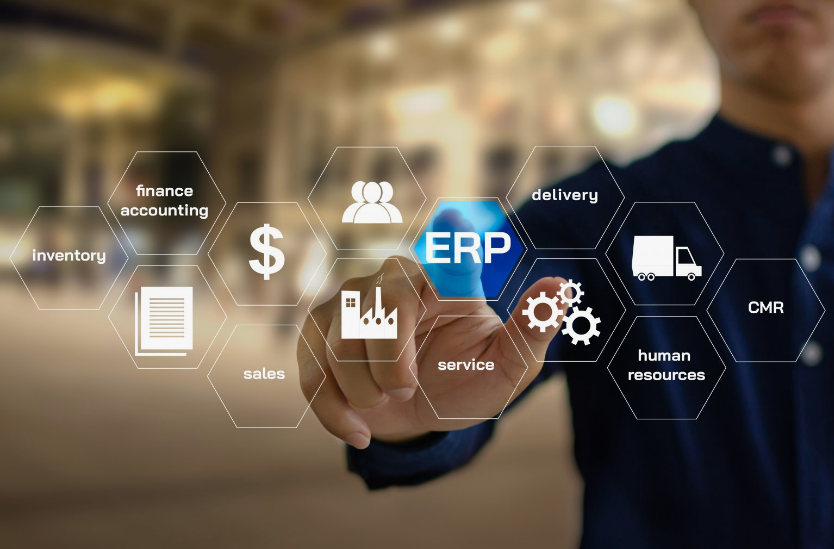AI Driven ERP Systems Future Of Nusaker
In the digital era, businesses of all sizes are looking for ways to improve operational efficiency, reduce costs and make data-driven decisions. Enterprise Resource Planning (ERP) systems have been a crucial part of this transformation allowing companies to automate processes integrate business functions and enable real-time reporting. However, as technology advances the traditional ERP systems are evolving to become more intelligent, adaptive and predictive.
Artificial Intelligence (AI) is playing a significant role in this transformation. AI-driven ERP systems are redefining the way businesses operate particularly in sectors like Nusaker, a term used to describe the emerging landscape of digital transformation in various industries, particularly in markets like Pakistan and across the globe. With AI technologies such as machine learning, natural language processing, and predictive analytics, AI-powered ERPs are poised to revolutionize business operations.
In this blog post, we will explore the future of AI-driven ERP systems, specifically focusing on their role in Nusaker. We will delve into the various aspects of AI in ERP, the benefits, challenges and the expected impact on businesses. Whether you are a business owner or an IT professional looking to stay ahead of the curve, this post will provide you with valuable insights into the transformative potential of AI in ERP systems.
What is AI-Driven ERP?
Enterprise Resource Planning (ERP) systems are integrated software platforms that help organizations manage core business processes such as inventory management, accounting, human resources, procurement and customer relationship management. These systems streamline data flow across the organization, eliminating the need for separate systems for each department, and offering a unified view of business operations.
An AI-driven ERP system takes this concept a step further by integrating advanced AI technologies into the traditional ERP framework. The AI components within the system can analyze vast amounts of data, recognize patterns, and make autonomous decisions. This is achieved through AI techniques such as machine learning (ML), natural language processing (NLP), and robotics process automation (RPA). AI-driven ERPs are designed to optimize business processes by making data-driven predictions, automating repetitive tasks, and providing real-time insights for better decisio making.
In Nusaker, the role of AI-driven ERPs has become increasingly relevant. As businesses in emerging markets look for ways to leverage new technologies to stay competitive, AI-powered ERPs offer the tools they need to automate complex tasks enhance productivity and improve customer service.
Key Features of AI-Driven ERP Systems
AI-driven ERP systems come with several advanced features that set them apart from traditional ERP solutions. Some of the key features include:
- Predictive Analytics: AI-powered ERPs can analyze historical data to predict future trends, enabling businesses to make proactive decisions. For example, in supply chain management, AI can forecast demand fluctuations, helping companies to manage inventory and avoid stockouts or overstocking.
- Automation: AI algorithms can automate repetitive tasks such as data entry, invoice processing, and order management. This not only reduces the chances of human error but also frees up valuable time for employees to focus on strategic tasks.
- Natural Language Processing (NLP): NLP enables AI-driven ERPs to understand and process human language. This can help businesses automate customer support through chatbots, improve reporting with voice commands, and analyze unstructured data from emails and social media.
- Machine Learning: Machine learning algorithms allow the ERP system to continuously learn from historical data, improving its decision-making abilities over time. For example, a machine learning model might learn from past customer behavior to recommend products more effectively.
- Real-Time Data Processing: With AI, ERP systems can process data in real-time, offering businesses up-to-date insights that can improve responsiveness and adaptability.
- Enhanced Decision Support: AI-driven ERP systems use advanced data analytics to provide actionable insights. These insights can guide decision-making in areas like resource allocation, financial forecasting, and demand planning.
Benefits of AI-Driven ERP Systems for Nusaker
As Nusaker continues to gain momentum in the world of digital transformation, businesses are looking for ways to improve operational efficiency, reduce costs, and enhance customer experiences. AI-driven ERP systems offer numerous benefits for organizations in Nusaker, which include:
1. Improved Efficiency and Productivity
AI-powered ERPs automate many manual processes, such as data entry, inventory management, and reporting. By reducing the need for human intervention in these routine tasks, employees can focus on more value-added activities that drive innovation and growth. AI systems are also capable of working around the clock, ensuring that business operations run smoothly without any downtime.
For example, businesses in Nusaker can automate the process of order fulfillment by using AI to track inventory levels, generate purchase orders, and even forecast when new stock is required. By minimizing human error and eliminating bottlenecks in these processes, companies can increase productivity and improve operational efficiency.
2. Cost Savings
One of the most significant advantages of AI-driven ERP systems is their ability to reduce operational costs. Automation reduces the need for manual labor, thereby decreasing overhead expenses. Furthermore, AI can identify inefficiencies in business processes, suggesting improvements that lead to cost savings.
In supply chain management, AI algorithms can optimize routing, reduce fuel consumption, and improve inventory turnover rates, resulting in significant cost savings. AI-driven ERP systems can also help businesses in Nusaker manage cash flow more effectively, with predictive analytics offering insights into cash flow trends, allowing businesses to make better financial decisions.
3. Enhanced Decision-Making
AI-driven ERPs offer enhanced decision support through data analysis, predictive analytics, and machine learning. Businesses can make more informed decisions, whether it’s about resource allocation, product development, or market expansion.
In Nusaker, businesses can benefit from the ability to anticipate market trends and customer preferences. For example, AI can analyze past purchasing behavior to identify patterns, enabling businesses to develop targeted marketing campaigns and improve customer retention strategies. Similarly, AI-driven ERPs can assist in demand forecasting, allowing companies to optimize their inventory levels and minimize wastage.
4. Improved Customer Experience
AI-driven ERP systems are instrumental in enhancing customer experiences by providing businesses with a 360-degree view of customer interactions. The integration of AI in ERP allows companies to personalize customer journeys, track behavior across different channels, and provide tailored recommendations.
For example, businesses can use AI-powered ERPs to analyze customer data and make personalized product recommendations in real time. Additionally, AI chatbots can handle customer service queries 24/7 offering quick and efficient responses which in turn improves customer satisfaction.
5. Scalability
AI-driven ERP systems offer great scalability, making it easier for businesses in Nusaker to grow without worrying about outgrowing their software. As a business expands, the AI system can adapt and scale with the organization allowing it to handle more complex operations and larger volumes of data.
AI-driven ERPs can integrate seamlessly with other business applications and third-party tools providing flexibility and adaptability as the business evolves. This scalability ensures that businesses in Nusaker can stay competitive in an ever-changing marketplace.
Challenges of AI-Driven ERP Systems
While the benefits of AI-driven ERP systems are clear, there are also several challenges associated with their implementation and usage. These challenges need to be addressed for successful adoption and integration.
1. High Initial Investment
The implementation of AI-driven ERP systems can be expensive. Businesses must invest in not only the software but also the infrastructure and training required to support it. This can be a barrier for small and medium-sized businesses in Nusaker, which may have limited resources.
2. Data Privacy and Security
AI-driven ERP systems rely on vast amounts of data to make accurate predictions and decisions. Ensuring the privacy and security of this data is a significant concern. Businesses must implement robust cybersecurity measures to protect sensitive customer and financial information.
3. Change Management
Adopting AI-driven ERP systems often requires a cultural shift within the organization. Employees may need to be retrained, and business processes may need to be reengineered. Resistance to change is a common challenge when implementing new technologies, and businesses must manage this transition carefully to ensure smooth adoption.
4. Data Quality
AI-driven ERPs rely on high-quality data to generate accurate insights. If the data inputted into the system is incomplete or inaccurate, the resulting predictions and recommendations may be flawed. Therefore, businesses in Nusaker must ensure that their data management practices are up to standard to maximize the benefits of AI-driven ERPs.
The Future of AI-Driven ERP Systems in Nusaker
The future of AI-driven ERP systems in Nusaker looks promising. As AI technologies continue to evolve, we can expect even more advanced capabilities within ERP systems, transforming the way businesses operate. Here are some trends to watch for:
- Integration with IoT: AI-driven ERPs will increasingly integrate with the Internet of Things (IoT) to provide real-time data from connected devices. This will allow businesses to monitor and optimize operations in real time, such as tracking the condition of equipment, inventory levels, and product performance.
- AI-Powered Predictive Maintenance: In sectors like manufacturing, AI-powered ERP systems will enable predictive maintenance, which anticipates equipment failures before they occur. This will reduce downtime, improve asset utilization, and reduce maintenance costs.
- Personalization and Automation at Scale: As AI algorithms become more sophisticated, businesses will be able to deliver highly personalized experiences at scale. From product recommendations to targeted marketing campaigns, AI will help businesses in Nusaker connect with customers on a deeper level.
- Cloud-Based Solutions: The shift toward cloud-based ERP solutions will continue, allowing businesses in Nusaker to access AI-powered systems without the need for extensive on-premise infrastructure. Cloud-based AI-driven ERPs will provide businesses with greater flexibility, scalability, and cost savings.
Conclusion
AI-driven ERP systems represent the future of business operations in Nusaker and beyond. By integrating AI technologies such as machine learning, natural language processing, and predictive analytics, businesses can optimize their operations, reduce costs, and improve decision-making. While the adoption of AI-driven ERPs comes with challenges, the potential benefits far outweigh the risks.
Read Also: Light Adjustable Lens Problems







